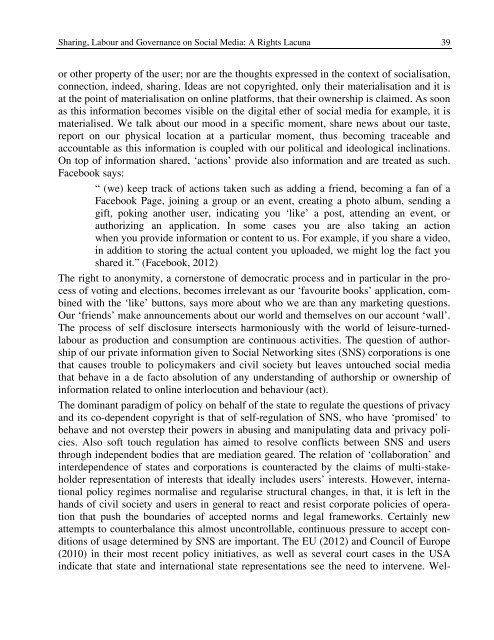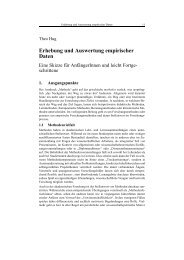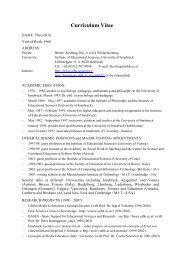Cultures and Ethics of Sharing - Universität Innsbruck
Cultures and Ethics of Sharing - Universität Innsbruck
Cultures and Ethics of Sharing - Universität Innsbruck
- Keine Tags gefunden...
Erfolgreiche ePaper selbst erstellen
Machen Sie aus Ihren PDF Publikationen ein blätterbares Flipbook mit unserer einzigartigen Google optimierten e-Paper Software.
<strong>Sharing</strong>, Labour <strong>and</strong> Governance on Social Media: A Rights Lacuna 39or other property <strong>of</strong> the user; nor are the thoughts expressed in the context <strong>of</strong> socialisation,connection, indeed, sharing. Ideas are not copyrighted, only their materialisation <strong>and</strong> it isat the point <strong>of</strong> materialisation on online platforms, that their ownership is claimed. As soonas this information becomes visible on the digital ether <strong>of</strong> social media for example, it ismaterialised. We talk about our mood in a specific moment, share news about our taste,report on our physical location at a particular moment, thus becoming traceable <strong>and</strong>accountable as this information is coupled with our political <strong>and</strong> ideological inclinations.On top <strong>of</strong> information shared, ‘actions’ provide also information <strong>and</strong> are treated as such.Facebook says:“ (we) keep track <strong>of</strong> actions taken such as adding a friend, becoming a fan <strong>of</strong> aFacebook Page, joining a group or an event, creating a photo album, sending agift, poking another user, indicating you ‘like’ a post, attending an event, orauthorizing an application. In some cases you are also taking an actionwhen you provide information or content to us. For example, if you share a video,in addition to storing the actual content you uploaded, we might log the fact youshared it.” (Facebook, 2012)The right to anonymity, a cornerstone <strong>of</strong> democratic process <strong>and</strong> in particular in the process<strong>of</strong> voting <strong>and</strong> elections, becomes irrelevant as our ‘favourite books’ application, combinedwith the ‘like’ buttons, says more about who we are than any marketing questions.Our ‘friends’ make announcements about our world <strong>and</strong> themselves on our account ‘wall’.The process <strong>of</strong> self disclosure intersects harmoniously with the world <strong>of</strong> leisure-turnedlabouras production <strong>and</strong> consumption are continuous activities. The question <strong>of</strong> authorship<strong>of</strong> our private information given to Social Networking sites (SNS) corporations is onethat causes trouble to policymakers <strong>and</strong> civil society but leaves untouched social mediathat behave in a de facto absolution <strong>of</strong> any underst<strong>and</strong>ing <strong>of</strong> authorship or ownership <strong>of</strong>information related to online interlocution <strong>and</strong> behaviour (act).The dominant paradigm <strong>of</strong> policy on behalf <strong>of</strong> the state to regulate the questions <strong>of</strong> privacy<strong>and</strong> its co-dependent copyright is that <strong>of</strong> self-regulation <strong>of</strong> SNS, who have ‘promised’ tobehave <strong>and</strong> not overstep their powers in abusing <strong>and</strong> manipulating data <strong>and</strong> privacy policies.Also s<strong>of</strong>t touch regulation has aimed to resolve conflicts between SNS <strong>and</strong> usersthrough independent bodies that are mediation geared. The relation <strong>of</strong> ‘collaboration’ <strong>and</strong>interdependence <strong>of</strong> states <strong>and</strong> corporations is counteracted by the claims <strong>of</strong> multi-stakeholderrepresentation <strong>of</strong> interests that ideally includes users’ interests. However, internationalpolicy regimes normalise <strong>and</strong> regularise structural changes, in that, it is left in theh<strong>and</strong>s <strong>of</strong> civil society <strong>and</strong> users in general to react <strong>and</strong> resist corporate policies <strong>of</strong> operationthat push the boundaries <strong>of</strong> accepted norms <strong>and</strong> legal frameworks. Certainly newattempts to counterbalance this almost uncontrollable, continuous pressure to accept conditions<strong>of</strong> usage determined by SNS are important. The EU (2012) <strong>and</strong> Council <strong>of</strong> Europe(2010) in their most recent policy initiatives, as well as several court cases in the USAindicate that state <strong>and</strong> international state representations see the need to intervene. Wel-








